Significance
TheGaianDragon. com
Love for the Earth
JamesClairLewis. com
Berenice
From: Phil
Saving Nemo & Our Oceans
Thank you! Aquaman ~ Ocean Defender
Facts about water, water crisis, drinking water,
sanitation, and water-related disease.
Drinking Water
Each year more than five million people die from water-related disease.
30 percent of water-related deaths are due to diarrhea.
84 percent of water-related deaths are in children ages 0 – 14.
98 percent of water-related deaths occur in the developing world.
For the first time, the number of people without improved drinking water has dropped below one billion.
Less than 1% of the world's fresh water (or about 0.007% of all water on earth) is readily accessible for direct human use.
A person can live weeks without food, but only days without water.
A person needs 4 to 5 gallons of water per day to survive.
The average American individual uses 100 to 176 gallons of water at home each day. The average African family uses about 5 gallons of water each day.
90 percent of all deaths caused by diarrheal diseases are children under 5 years of age, mostly in developing countries.
Sustainable management of water resources and sanitation provides great benefits to a society and the economy as a whole...access to safe drinking water is essential for achieving gender equality, sustainable development and poverty alleviation.
Water systems fail at a rate of 50% or higher.
Poor people living in the slums often pay 5-10 times more per liter of water than wealthy people living in the same city.
Sanitation
2.5 billion people still lack access to improved sanitation, including 1.2 billion people who still have no facilities at all.
The majority of the illness in the world is caused by fecal matter.
At any one time, more than half the poor of the developing world are ill from causes related to hygiene, sanitation and water supply.
Eighty-eight percent of cases of diarrhea worldwide are attributable to unsafe water, inadequate sanitation or insufficient hygiene.
Numbers of those living on less than US $2 a day: 2.5 billion. Numbers of those without sanitation: 2.6 billion.
Lack of sanitation is the world’s biggest cause of infection.
Only 62 percent of the world’s population has access to improved sanitation – that is, a sanitation facility that ensures hygienic separation of human excreta from human contact.
Of the 60 million people added to the world’s towns and cities every year, most occupy impoverished slums and shanty-towns with no facilities.
Impacts on Kids
Every 15 seconds, a child dies from a water-related disease.
Children in poor environments often carry 1000 parasitic worms in their bodies at any time.
For children under age five, water-related diseases are the leading cause of death.
1.8 million children die each year from diarrhea – 4,900 deaths each day.
Impacts on Women
Millions of women and children spend several hours a day collecting water from distant, often polluted sources.
Lack of toilets makes women and girls vulnerable to violence if they are forced to defecate only after nightfall and in secluded areas. Sanitation enhances dignity, privacy and safety, especially for women and girls. Schools with decent toilet facilities enable children, especially girls reaching puberty, to remain in the educational system.
Evidence shows that women are responsible for half of the world’s food production (as opposed to cash crops) and in most developing countries, rural women produce between 60-80 percent of the food. Women also have an important role in establishing sustainable use of resources in small-scale fishing communities, and their knowledge is valuable for managing and protecting watersheds and wetlands.
Impacts on Health
At any given time, half of the world’s hospital beds are occupied by patients suffering from a water-related disease.
It is estimated that improved sanitation facilities could reduce diarrhea-related deaths in young children by more than one-third. If hygiene promotion is added, such as teaching proper hand washing, deaths could be reduced by two thirds. It would also help accelerate economic and social development in countries where sanitation is a major cause of lost work and school days because of illness.
No intervention has greater overall impact upon national development and public health than the provision of safe drinking water and the proper disposal of human waste.
Human health improvements are influenced not only by the use of clean water, but also by personal hygiene habits and the use of sanitation facilities.
Close to half of all people in developing countries are suffering at any given time from a health problem caused by water and sanitation deficits.
The water and sanitation crisis claims more lives through disease than any war claims through guns.
Impacts on Productivity
Estimated economic benefits of investing in drinking-water and sanitation: 272 million school attendance days a year, an added 1.5 billion healthy days for children under five years of age, together representing productivity gains of US $9.9 billion a year Values of deaths averted, based on discounted future earnings, amounting to US $3.6 billion a year
SOURCE
Global Water: Water Crisis
50 Ways To Be Water Smart!
In Your Home
1. Never pour water down the drain when there may be another use for it. Use it to water your indoor plants or garden.

2. Make sure your home is leak-free. Check your water meter when you are certain that no water is being used.If the meter reading changes, you have a leak!
3. Repair dripping faucets by replacing washers. One drop per second wastes 2,700 gallons of water per year!

4. Retrofit all household faucets by installing aerators with flow restrictors.
5. Check for toilet leaks by adding food coloring to the tank. If you have a leak, the color will appear in the bowl within 30 minutes. (Flush immediately to avoid stains.)
6. If the toilet handle frequently sticks in the flush position, letting water run constantly, replace or adjust it.

7. Install a toilet displacement device to cut down on the amount of water needed for each flush. (Don't use a brick! There are devices available at most hardware and home centers.) Be sure installation does not interfere with the operating watering flowersparts. Consider low-volume toilets which use less than half the water of older models. NOTE: In many areas, low-volume units are required by law.
8. Take shorter showers. Replace your showerhead with an ultra-low-flow version.
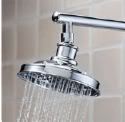
9. Place a bucket in the shower to catch excess water to water plants.
10. In the shower, turn water on to get wet; turn off to lather up; then turn the water back on to rinse off. Repeat when washing your hair.
11. Operate automatic dishwashers and clothes washers only when they are fully loaded or set the water level for the size of load you are using.
12. When hand washing dishes, save water by filling two containers – one with soapy water, one with rinse water containing a small amount of chlorine bleach.
13. Store drinking water in the refrigerator. Don't let the tap run while you are waiting for water to cool.
14. Do not use running water to thaw meat or other frozen foods. Defrost food overnight in the refrigerator, or use the defrost setting on your microwave.
15. Kitchen sink disposals require lots of water to operate properly. Start a compost sinkpile as an alternate method of disposing of food waste.
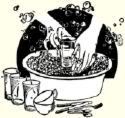
16. Do not waste water waiting for it to get hot. Capture it for other uses such as plant watering or heat it on the stove or in a microwave.
17.Consider installing an instant hot water heater on your sink and insulating your water pipes.
18. Think twice about installing a water-toair heat pump or air-conditioning system. Newer air-to-air models are just as efficient and do not waste water.
19. Don't let water run while brushing your teeth, washing your face or shaving.

20. Install water softening systems only when necessary.Turn softeners off while on vacation.
21. If you have a well at home, check your pump periodically. If the pump kicks on and off while water is not being used, you have a leak.
22. Avoid flushing the toilet unnecessarily.(if it’s yellow, let it mellow, and if its brown, flush it down) Dispose of tissues, insects and other similar waste in the trash rather than the toilet.OR save tissues for composting!
Saving Water Outdoors
23. Sprinkler Don't overwater your lawn.Lawns only need watering every five to seven days in the summer, and every 10 to 14 days in the winter. A heavy rain eliminates the need for watering for up to two weeks. Buy a rain gauge. Most of the year, lawns only need one inch of water per week.
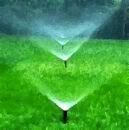
24. Plant it smart.Xeriscape landscaping is a great way to design, install and maintain both your plants and irrigation system. It will save time, money and water.
25. Water lawns during the early morning hours when temperatures and wind speed are the lowest.This reduces evaporation and waste.
26. Position sprinklers so water lands on the lawn and shrubs and not on paved areas.
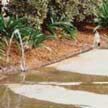
27. Install irrigation devices that are the most water efficient for each use. Micro and drip irrigation and soaker hoses are examples of efficient devices.
28. Check sprinkler systems and timing devices regularly to be sure they operate properly. Florida law now requires that "anyone who purchases and installs an automatic lawn sprinkler system MUST install a rain sensor device or switch which will override the irrigation cycle when adequate rainfall has occurred."
29. Grass.Raise the lawn mower blade to at least three inches, or to its highest level. A higher cut encourages grass roots to grow deeper, shades the root system and holds soil moisture.
30. Avoid over fertilizing your lawn. Applying fertilizer increases the need for water. Apply fertilizers which contain slow release, water-insoluble forms of nitrogen.
31. Use mulch to retain moisture in the soil.(Help preserve native cypress forests by selecting other types of mulch such as treated melaleuca.) Mulch also helps control weeds that compete with landscape plants for water.
32. Plant native and/or drought-tolerant grasses, ground covers, shrubs and trees. Once established, they do not need water as frequently and usually will survive a dry period without watering. They also require less fertilizer or herbicides. Group plants together based on similar water needs.
33. Use a broom or blower instead of a hose to clean leaves and other debris from your driveway or sidewalk.
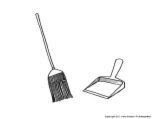
34. Use a shut-off nozzle on your hose which can be adjusted down to a fine spray, so that water flows only as needed. When finished, turn it off at the faucet instead of at the nozzle, to avoid leaks. Check hose connectors to make sure plastic or rubber washers are in place. Washers prevent leaks.
35. Hose nozzle.Do not leave sprinklers or hoses unattended. A garden hose can pour out 600 gallons or more in only a few hours. Use a bell timer to remind yourself to turn sprinklers off.
36. Avoid purchasing recreational water toys which require a constant stream of water.
37. Consider using a commercial car wash that recycles water. If you wash your own car, park on the grass and use a hose with an automatic shut-off nozzle.
38. Avoid installing ornamental water features (such as fountains) unless they use recycled water.
39. If you have a swimming pool, consider a new water-saving pool filter. A single backflushing with a traditional filter uses 180 to 250 gallons of water.
General Water Saving Tips
40. Water droplet.Participate in public water conservation meetings conducted by your local government, utility or water management district.
41. Follow water conservation and water shortage rules in effect. Even if your water comes from a private well – you are included in restrictions.
42. Encourage your employer to promote water conservation in the workplace.
43. Patronize businesses which practice water conservation, such as restaurants that only serve water upon request.
44. Report water losses (broken pipes, open hydrants, errant sprinklers, abandoned free-flowing wells, etc.) to the property owner, local authorities or your water management district.
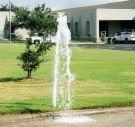
45. Encourage your school system and local government to help develop and promote a water conservation ethic.
46. Support projects that will lead to an increased use of reclaimed waste water for irrigation and other uses.
47. Support efforts that create a concern for water conservation among tourists.
48. Promote water conservation in community newsletters, on bulletin boards and by example. Encourage your friends, neighbors and co-workers to "be water smart."
49. Conserve water because it is the right thing to do – even when someone else is footing the bill, such as when you are staying at a hotel.
50. Try to do one thing each day that will result in saving water.Every drop counts!

Aquaman ~ Ocean Defender

Comments